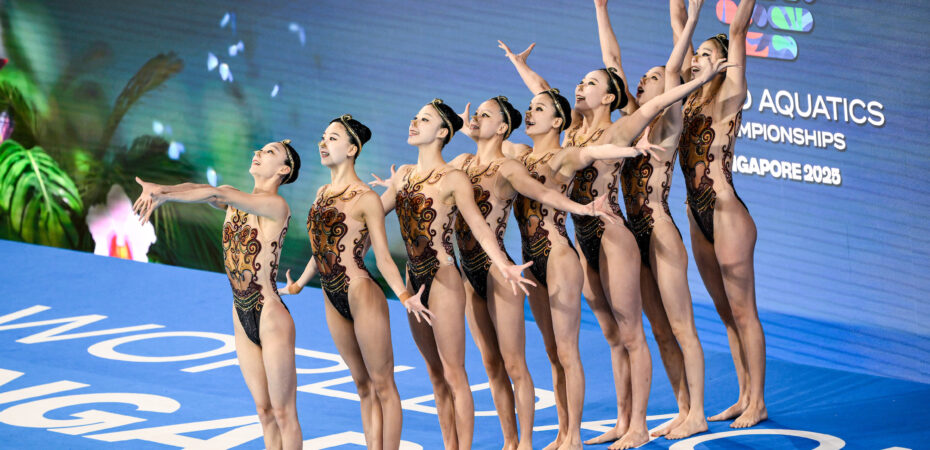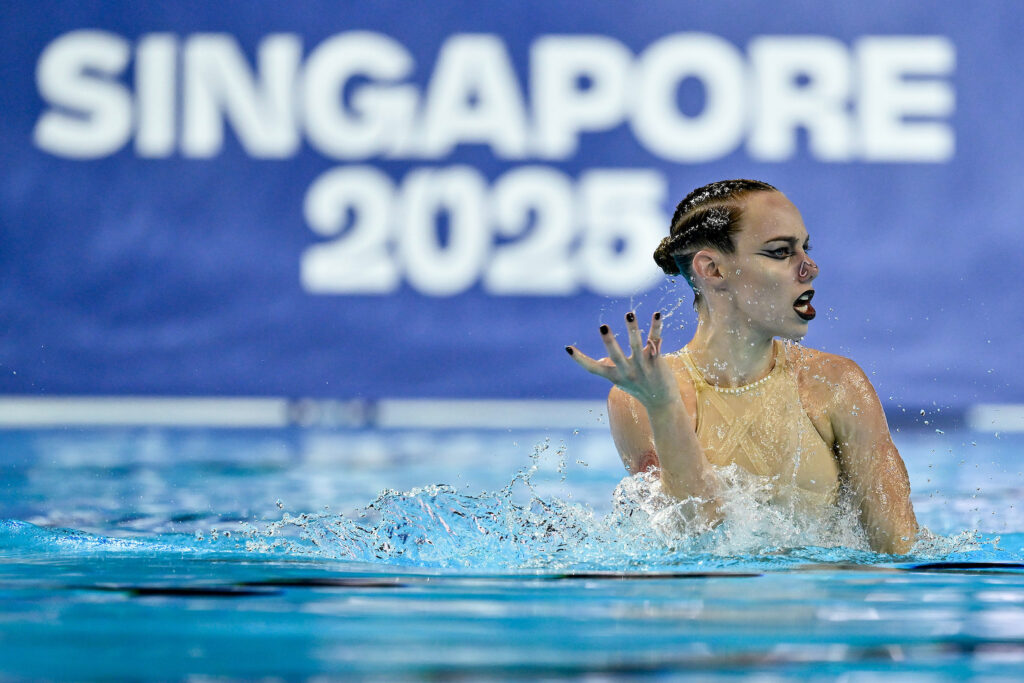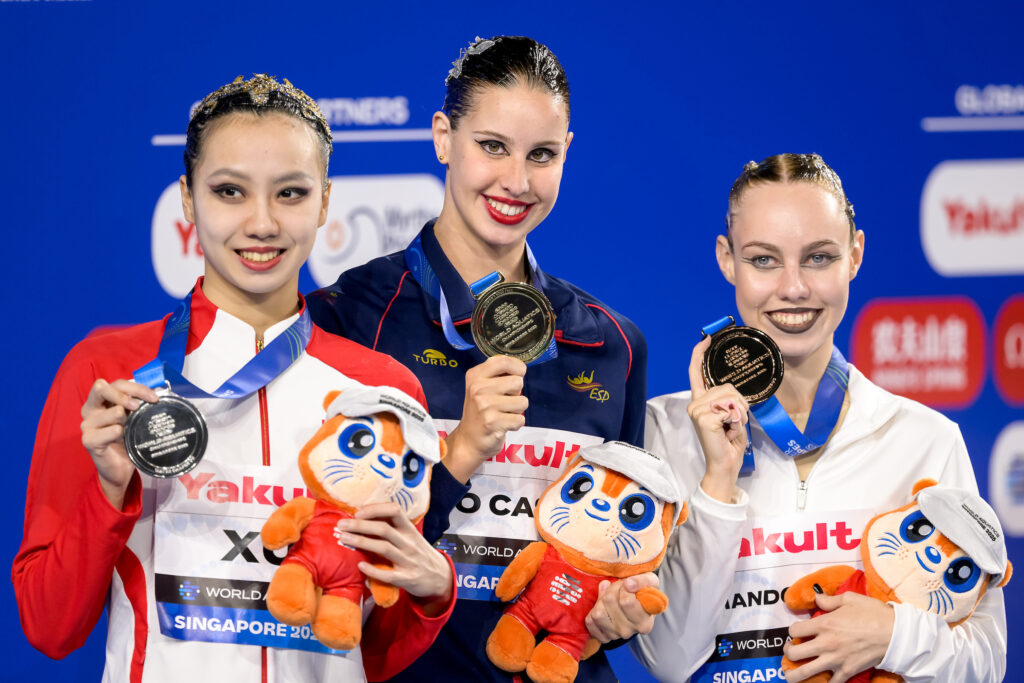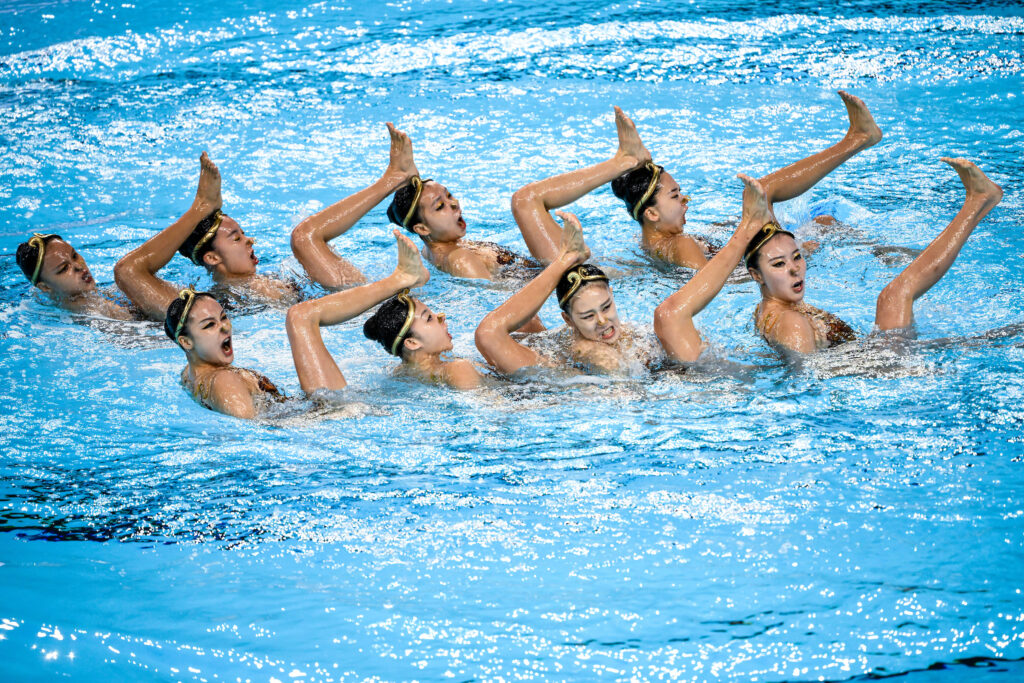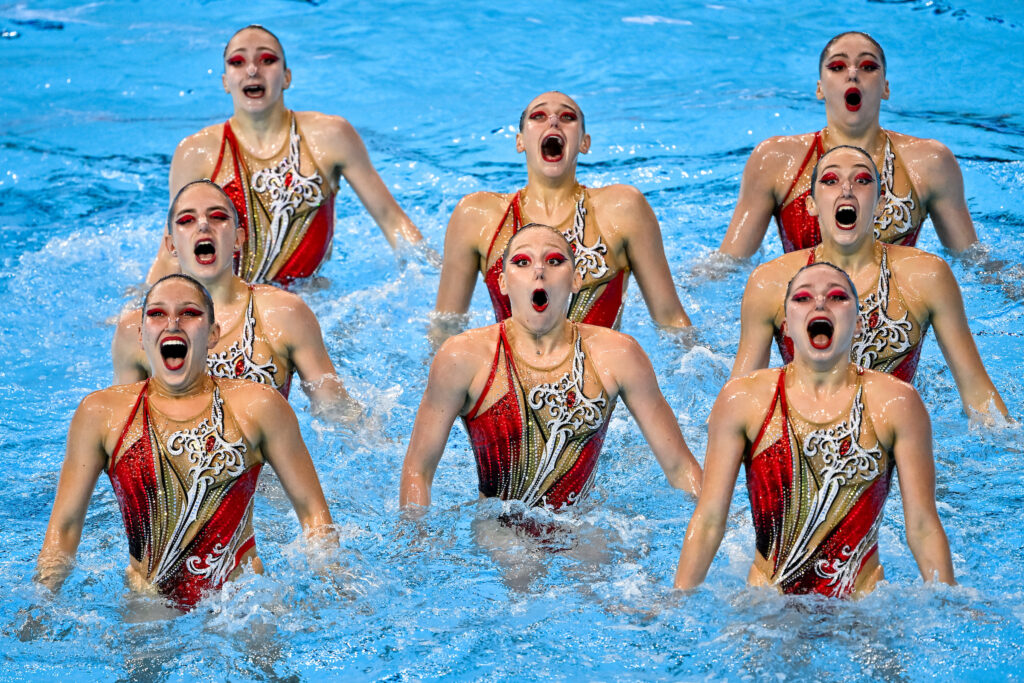Two more titles were awarded on the fifth day of artistic swimming at the World Championships in Singapore. Iris Tio made history by becoming Spain’s first-ever World Champion in the women’s solo, taking the win in the free event, while the People’s Republic of China continued its dominance with a third gold medal, this time in the technical team final. Both events delivered emotional, high-stakes performances and significant shake-ups in the rankings.
Women’s Solo Free Final
The top 12 soloists from the preliminaries returned to the pool early this morning for another shot at the podium in Singapore. In the end, it was the same trio from the technical solo who claimed the medals once again, though in a completely different order.
Spain has a new World Champion. 22-year-old Iris Tio claimed her first individual world title in this solo free final, marking a milestone for her country in this event.
For a nation with a deep and influential history in solo — from Gemma Mengual to Andrea Fuentes to Ona Carbonell — it’s only the first time a female Spanish soloist stands atop the world podium.
Tio swam to “Hymne à l’Amour” by Celine Dion, and was captivating with a performance rich in nuance, grace, and artistic presence. She had qualified third out of preliminaries, only 3.4674 points behind the top spot, and increased her degree of difficulty (DD) by 1.15 heading into the final. Her total score rose by more than 10 points, finishing at 245.1913, which was enough to surpass both Xu and Khandoshka, ahead of her in the prelims.
She even received one 10.0 in artistic impression and visibly poured every ounce of emotion into her swim. Her reaction on the podium was just as powerful, as her chin trembled and she held back the tears, overwhelmed and soaking in the moment.
“I’m super happy,” she said. “I can’t believe it right now. I feel very emotional because my parents are here in the stands. When I was little, the dream of becoming a world champion was deep in my soul. I’m still in shock. It really is a dream come true.”
Tio is one of the busiest artistic swimmers in Singapore as she is competing across all four categories: solo, duet, mixed duet, and team. So far, she has medaled in every event she’s entered: gold today in the free solo, and bronze in technical solo, free team, and technical team. With two more events still to come, she remains a strong contender for more podium finishes.
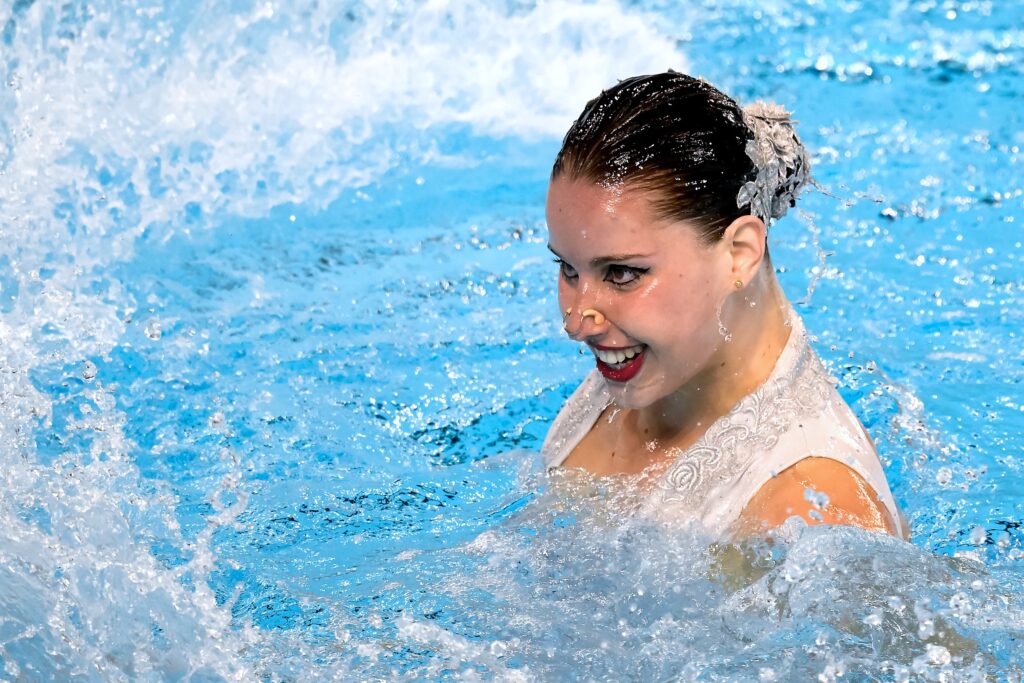
Silver went to Xu Huiyan of the People’s Republic of China, who had come in as the top qualifier and recent technical solo World Champion.
Swimming to “Eternal Night Sky,” Xu scored 241.0025. The 19-year-old had also raised her DD by 1.2 for the final, but her execution and artistic impression scores ultimately weren’t enough to hold onto gold.
“I made some adjustments for the final,” she said. “I just tried to take everything steadily, to make improvements in terms of artistic impression and creativity. I’m not sad about the result. Actually, I’ve improved a lot in the past few weeks. I just feel like I still have so much more to work on.”
Bronze went to Vasilina Khandoshka (Neutral Athlete A), who retained her spot on the solo free podium for a second consecutive World Championships thanks to a score of 239.5437.
She swam a bold, unconventional routine to the theme of “Mummy,” with intriguing musicality and thematic choices. She had matched her DD from prelims and finished just behind Xu once again, a solid result following her technical solo silver earlier this week.
“This bronze medal means a lot,” she said. “This routine was physically difficult for me, and I had to really fight and push myself to the end. I searched for many musical tracks for this routine; I wanted some strange music that was more niche and less popular. I tried to make a theatrical show that wasn’t just an ordinary routine.”
In the battle just off the podium, Vasiliki Alexandri of Austria and Klara Bleyer of Germany had come into the final with the highest degree of difficulty increases: +3.9 and +3.8, respectively. Bleyer actually now holds the highest DD overall in this event with 60.40.
World silver medalist in 2023, Alexandri swam again her new “Squid Game” routine, which she debuted in the preliminary round, and switched places with Bleyer to land in fourth place, just 0.5461 behind bronze.
Understandably disappointed but proud of her performance, the 27-year-old had also placed fourth in the technical solo event earlier this week.
“I took the risk to at least have a chance to fight for the podium,” she told the Austrian Swimming Federation. “For me, everything was open. It could have worked, but I could have also finished last with a basemark. I’m proud that I managed to swim such a big difficulty. I couldn’t have done more. If I hadn’t taken the risk today, I would have regretted it a lot.
I’m very sad, of course. But I’m proud of fourth place, and it’s only a matter of 0.5 points. Of course, I’d rather be fourth, five points behind, but there’s nothing you can do about it. Finishing fourth at the World Championships twice is still a fantastic achievement.”
Bleyer, the reigning European Champion, finished fifth with her “Space” routine and a score of 237.5600, matching her placement from last year’s World Championships in Doha.
“I can definitely be proud, even if it’s not the overall result I was hoping for,” she told the German Swimming Federation. “But I gave it my best.”
“Only those who set high goals can be disappointed; that’s the path to the top in competitive sports,” added national coach Stephanie Marx. “She’s 21 now and hasn’t reached her peak yet; the next four to six years belong to her. Everyone has seen where her strengths lie, how courageous she was, and how she’s improved this year. The next step will come.”
It was also a pleasure to see Italy’s Enrica Piccoli back in the solo field on the world stage. Returning to this event this season for the first time since her junior days in 2017, she brought elegance, polish, and maturity to the pool. A refined and technically sound athlete, she is a welcome presence in solo, and hopefully for years to come.
Technical Team Final
The evening delivered one of the most anticipated showdowns of the meet: the People’s Republic of China vs. the Neutral Athletes B in the technical team final.
It was the first time since the Tokyo Olympic Games that two of the world’s most dominant artistic swimming programs met in direct competition. Back then, it was the Russian athletes atop the podium. Today, the Olympic Champion China confirmed it is now the team to beat.
Performing its stellar “Wukong” routine, Team China was a class above in every aspect, from the sublime technique to the creative choreography, from the sharp execution to the precise movements of every athlete. The Chinese scored 307.8001, defending their World title and continuing their dominance in the team events.
“We’ve waited for this chance to compete against a team we’ve been wanting to measure ourselves against for a very long time,” Feng Yu said. “That makes this result special. It is only when you have tough competition that you are able to learn and improve.”
“This is a very special day,” head coach Zhang Xiaohuan said. “It’s the first time [under the new system] the Chinese team have been able to directly compete against their biggest rivals on a stage like this. It’s a moment we waited a long time for. This gold medal doesn’t feel second to the gold we won at the Olympic Games. Our swimmers performed very well today. They improved on the things they didn’t do so well in during the preliminary, and with that, they won this title.”
The Neutral Athletes B claimed silver with their “Sabre Dance” routine, earning 300.6183. For all young Russian swimmers on this squad, it was their first major international outing, and they delivered a technically strong and confident performance. Their trademark height, technique and stability were still very much there, while the overall execution remained sharp.
The musicality was effective and well-aligned with the structure of the routine, but choreographically, it perhaps lacked the creativity and individual movement complexity to be on par with the very top. Compared to China’s intricate transitions and element setups, the Russians’ choreography felt more basic, and maybe didn’t quite do justice to the talent of these athletes.
Undoubtedly, this isn’t where they would have hoped to place on their return, especially for a country that dominated the sport for decades, but it’s also their first time competing internationally under the new rules. Like most others before them, adaptation takes time, and the potential to reclaim the top spot is clearly still very much there.
“We are very happy to be here,” Anastasiya Bakhtyreva said. “This is our first experience at such a high level competition, and we feel a tremendous amount of emotions, we are very excited. We are still a little bit tired after the routine, and we will need some time to recover. It was fantastic to perform our routine here in Singapore, we hope everybody enjoyed it.”
“I feel a little bit tired, but I am satisfied with the team’s performance,” head coach Tatyana Pokrovskaya said. “I am looking forward to the next team event, the acrobatic routine. Yes, I am just looking forward to the acrobatic routine.”
Silver medalist in Doha, Spain clinched bronze here with 294.8575, presenting their fun, crowd-pleasing routine to the song “Everybody” by the Backstreet Boys.
After a bronze in the free routine, the European Champions continue to showcase consistent strength and creative choreography in the team events.
“We did a perfect job,” Cristina Arambula said. “We really enjoyed the routine. In fact, this was the best time we swam this routine, so we are all very happy for this performance.”
In fourth and fifth, Japan and Italy were nearly inseparable, with only 0.0943 between them. Japan had come into the event after a basemark in prelims but cleaned up their performance for finals, while Italy significantly increased its artistic impression score between the two rounds.
This finish for Italy is particularly noteworthy, as closing the gap on Japan marks a meaningful step forward for a squad that has clearly rebounded since its disappointment at the Paris Olympics, where it finished eighth. While the team also placed fifth at the last World Championships, this performance in a deeper, more complete field, feels more significant and a clear sign of the program’s resurgence.
USA, which had two costly basemarks in the prelims, climbed significantly and finished sixth, looking a lot more settled after yesterday’s twists and turns. Reserve Emileen Moore remained in the routine in the place of Daniella Ramirez, and looked more confident as well.
Ukraine was not far behind, just 0.6 off the Olympic silver medalists, and showed encouraging progress in the World rankings with this renewed squad.
Tomorrow is all about the duets in Singapore. The day will start with the free duet preliminary at 10:00 am, followed by the technical mixed duet final at 7:30 pm local.
ARTICLE BY CHRISTINA MARMET
Cover photo: Andrea Staccioli / Deepbluemedia
If you’ve enjoyed our coverage, please consider donating to Inside Synchro! Any amount helps us run the site and travel costs to cover meets during the season.

